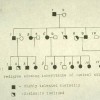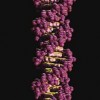Posts tagged heritability

Eliminating Undesirable Traits
Feb 18th
Eugenics aimed to eliminate undesirable traits. But how do you define “undesirable”? There is anecdotal evidence that the incidence of some disorders has decreased due to genetic testing (see “Testing Curbs Some Genetic Diseases,” by Marilyn Marchione). In and of itself, this is a good thing, but is this eugenics? It would be hard to argue that most genetic diseases are undesirable; but some of the steps taken to eliminate disease — abortion, embryo screening — are controversial.
In contrast, there was a an effort to prevent hereditary blindness within the eugenics movement. Its proponents collected pedigrees, drafted legislation to prevent More >

It’s All Your Parents’ Fault
Sep 15th
Eugenicists looked at a diversity of “traits” and asserted that many of them were genetically inherited, excluding any other cause. The subjects of the studies often came from unique populations, including circus performers, residents in mental institutions, and even historical figures, long deceased.
A quick search in the Eugenics Archive reveals some of the traits studied by Eugenicists:
Civic leadership Musical ability Dressmaking Epilepsy Dwarfism Giantism Carpentry Deafness Eye color Insanity Longevity Shiftlessness Cancer Blindness Albinism Hemophilia Boat building Degeneracy Poverty Feeblemindedness Cleft palate Hare lip Manic depression Hair color, texture Polydactyly Height Literary ability Inventiveness Color blindness Mechanical skill Artistic ability More >

Passing on Genes and Traits
Sep 9th
Why do you look the way you do? There are many ways to answer this question, but essentially it all comes down to the information in your DNA and the proteins your cells make. Your DNA contains genes that code for proteins. Different proteins have different functions, each contributing to your various traits and functions.
Why do we often see similar traits among parents and offspring? We inherit our DNA from our mother and father. This means we have half of our genes, or recipes, from our mom and half from our dad. Even with this basic idea, it can be More >

Teaching Genetics: Simplicity for Success
Sep 2nd
I love to talk about the biology behind how life works with other people. Some of the best conversations I have ever had have been with fifth graders learning about DNA. I am amazed that they know an incredible amount of information relating to genetics, way more than I ever knew when I was their age.
I currently teach genetics and molecular biology to middle school students, high school students, teachers, and the general public. One of the greatest skills I have learned in my current position is the importance of engaging your audience and making the material you are introducing More >

Do Genes Always Follow the Rules?
Aug 31st
As a teacher, I find that the presentation of classical Mendelian inheritance is important, but can be misleading. Do genes always follow the rules that the “Father of Genetics” observed in his garden? Don’t get me wrong, I appreciate Mendel and his contribution to genetics, but the exceptions seem much more interesting!
For example, many genes are pleiotropic, meaning they affect more than one phenotype. How about the recent development on red heads and anasthetics? I happen to live with a red head, from a long line of red heads, so in our family this was a topic of discussion for days. The mutation More >
